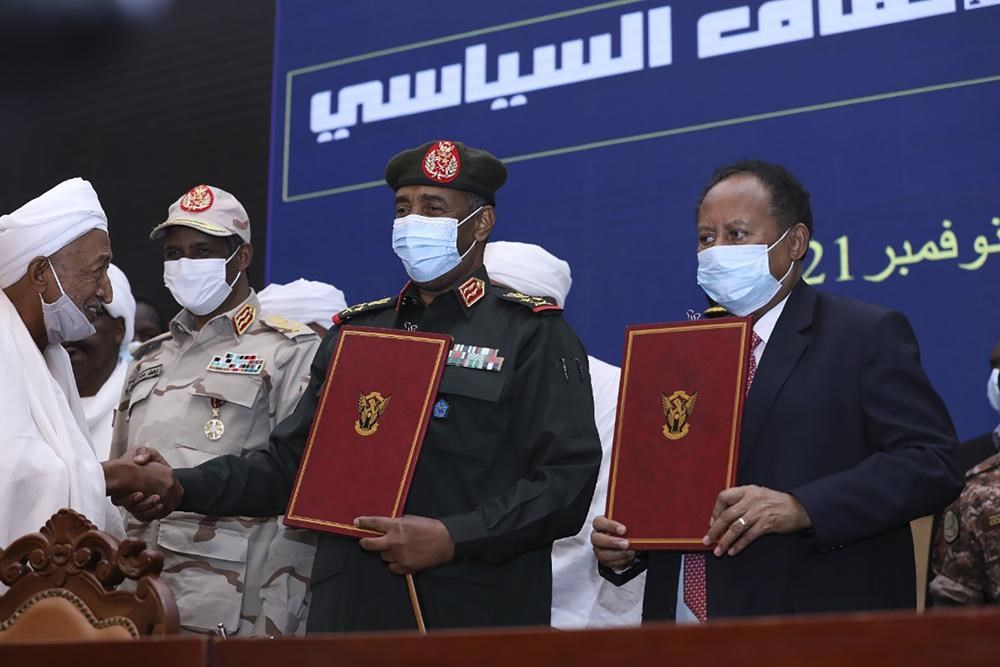NYT: How Sudan devolved into war
Foreign envoys came 'tantalizingly close' to brokering a deal between the warring generals that would transition Sudan into civilian rule, before the situation devolved into war.
-

General Abdel Fattah al-Burhan pictured alongside Prime Minister Abdalla Hamdok and Mohammed Hamdan Dagalo in a ceremony to reinstate Hamdok, who was forced out of office by a coup led by the pair, 25 October 2021. (AP)
Foreign envoys held extensive meetings with Sudan's Abdel Fattah al-Burhan and Mohammed Hamdan Dagalo (Hemedti), in which the two came "tantalizingly close" to a US-UK brokered deal just days before conflict ensued in Sudan, according to a report by The New York Times.
The envoys hoped to finally broker a deal between the two Generals to transition the country into a civilian-led government. The attempts seemed to have been fruitful as the two even had dinner at the home of another senior general, according to the report.
However, while promises were made and concessions extracted, the troops of both the Sudanese Armed Forces (SAF) and the Rapid Support Forces (RSF) surrounded each other ready for combat.
Any chance for dialogue was squandered as the two groups fell into fierce clashes on Saturday.
Some have put into question the role of foreign powers that were supposedly there to guarantee a peaceful transition into civil government and have accused different Arab and Western governments of the conflict that has claimed the lives of 270 civilians so far.
Going up the ranks
The New York Times report explains that al-Burhan and Hemedti came into power 18 months ago in a coup after sidelining other civil and societal actors, claiming that they have a duty to protect the nation's interests.
Both generals' careers took off in the early 2000s, as President al-Bashir employed the services of al-Burhan to aid in bringing a stop to turmoil in Western Sudan, while Hemedti was part of the Janjaweed; a conglomeration of Arab tribal militant groups active in Darfur and parts of Chad. Hemediti also aided in the fight in the west of the country and was eventually appointed by al-Bashir as head of the newly formed RSF.
Hemedti made a fortune from gold mining concessions and hefty commissions he received from sending mercenaries to fight for the UAE in the Saudi-led aggression on Yemen, according to the report.
Taking control of Sudan
When protests gained traction in 2019, both al-Burhan and Hemedti turned on al-Bashir and replaced him with defacto military rule. Two months after coming into power, the generals sent troops to put out protests in the country, with at least 120 civilians being killed in the process.
In October 2021, the two generals came together again and ousted the country’s prime minister, Abdalla Hamdok.
Both generals had ties with Israeli officials and discussed a normalization process with the Israeli government and Mossad officials since coming into power, going against the historic and popular choice of the Sudanese people.
Kholood Khair, a Sudanese political analyst, told The New York Times that, "The generals faced no accountability," adding, "The abductions, disappearances, sham trials, unlawful detentions — the internationals turned a blind eye to all of that for the sake of a political process that has now gone horribly wrong."
In theory, foreign powers pushed for a transition to civilian government, but in reality, sanctions that promised to target Hemedti's financial interests in the Gulf were never implemented, a former US official told The New York Times.
Brewing feud between the military men
As international efforts attempted to take Sudan into a civilian authority, both generals attempted to protect their interests within the prospective new system. However, with this process, deep contradictions between the two men began to surface.
The RSF leader worried that the army was being infiltrated by Islamists and loyalists of al-Bashir, via The New York Times.
The report added that military intelligence linked to al-Burhan complained to foreign officials that Hemedti tried to secretly import military drones from Turkey in an attempt to grow his military force.
A Western ambassador described RSF troops as "a bunch of jumped-up yahoos from the sticks, not proper military men," a sentiment that regular troops of the Sudanese Army shared.
On the other hand, RSF soldiers felt resentment towards the SAF soldiers due to the discrimination they faced and "believed it was their turn to hold power in Khartoum", the report stated.
Read more: Over 5,000 Egyptian students stuck in Sudan, send distress calls.

 4 Min Read
4 Min Read








